国际经贸高级英语 精读与翻译 第7课 中英对照课文翻译共27页
《高级英语》第一册课文7-15翻译、词汇_张汉熙
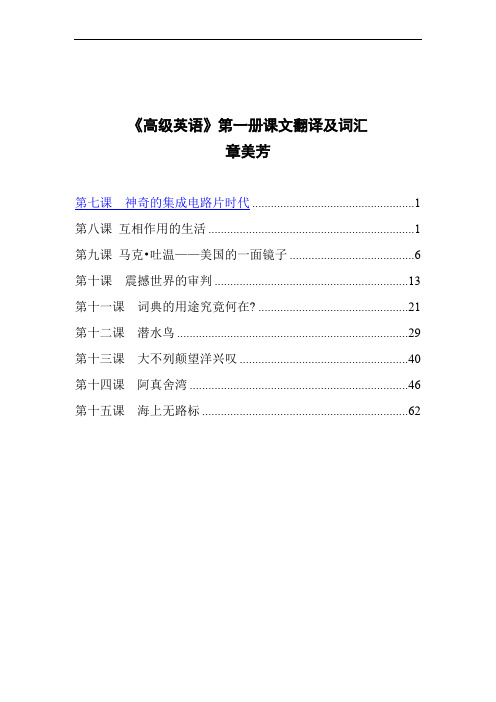
Learn General Secretary on "two to learn a" strengthening "four Consciousnesses" important speech caused a strong reaction in the country. Time, watching "red treasure", the origin of building the party back to power, how to strengthen services for the masses, improve party cohesion, fighting to become the grass-roots party members and masses hot topic. Grass-roots party organizations "two" is to strengthen the service of party members and cadres, the pioneer spirit. Distribution of grass-roots party organizations in all walks of people, clothing, shelter, which belongs to the nerve endings of the party organization and comments reputation has a direct perception of the masses. Strengthen the party ahead of the "pedal" spirit; strengthen the party members and cadres "success does not have to be me" and "the first to bear hardships, the last to" service spirit to set the party's positive image among the people is important. Grass-roots party organizations "two" is to cleanse all people not happy not to see "stereotypes", establish the honest faithful, diligent faith for the people. No need to avoid mentioning that, some members of our party can not stand the "money," corrosion of temptation, thin, Xu Zhou, such abuse and corrupt bribery, malfeasance borers, and rats. Two, is to clean up, thin, Xu, Zhou's solution to restore the party's fresh and natural, solid and honest work style. Cleansing "take, eat, card," undesirable and behaviour, "cross, hard and cold, push" attitude. Grass-roots party organizations "two" is to strengthen the sense of ordinary party members, participating in consciousness, unity consciousness. For reasons known, members of grass-roots party branches less mobile, less resources, and the construction of party organizations have some lag. Two studies, is to focus on the grass-roots party branches "loose, soft, loose" problem, advance the party members and cadres, "a gang working", "Hong Kong report." Strong cleanup actions, style and rambling, presumptuous "unqualified" party members, pays special attention to party members and cadres "joining party of thought" problem. "Party building" is obtained in the long-term development of our party's historical experience accumulated. Two is our party under the new historical conditions, strengthen the party's construction of a new "rectification movement." Grass-roots party organizations should always catch the hard work, results-oriented. Two educational outcomes are long-term oriented and become an important impetus for the work. "Two" should have three kinds of consciousness "two" study and education, basic learning lies in the doing. Only the Constitution address the series of party rules, and do solid work, be qualified party members had a solid ideological basis. Only the "learning" and "do" real unity, to form a "learn-learn-do-do" the virtuous cycle, and ultimately achieve the fundamental objective of education. This requires that the Organization《高级英语》第一册课文翻译及词汇章美芳第七课神奇的集成电路片时代 (1)第八课互相作用的生活 (1)第九课马克•吐温——美国的一面镜子 (6)第十课震撼世界的审判 (13)第十一课词典的用途究竟何在? (21)第十二课潜水鸟 (29)第十三课大不列颠望洋兴叹 (40)第十四课阿真舍湾 (46)第十五课海上无路标 (62)learning education, need three kinds of consciousness: one is to establish an integrated awareness. "Learning" and "do" what car isTwo-wheel, bird wings, need to go hand in hand, one end can be neglected. Communist theoretician and man. Only by closely combining theory and practice together in order to truly realize their value. "Learning" is the Foundation, the Foundation is not strong, shaking; " "Is the key to net to net thousands of accounts. "Two" education, "" lay the basis, going to "do" the key grip, so that the "learning" and "doing" back to standard, so that the majority of party members "learn" learning theory of nutrients, in the "doing" practice party's purposes. Second, to establish a sense of depth. "Learning" and "do" not Chu drawn, entirely different, but the organic unity of the whole. "Two" learning education, we need to explore integrating "learning" in "do", exhibit "do" in "Science". To avoid the "learning" into simple room instruction, "do" into a monotone for doing. Should exploration "learn" in the has "do", "do" in the has "learn" of education and practice of carrier, makes general grass-roots members can in "learn" in the has "do" of achievements sense, in "do" in the has "learn" of get sense, real makes party of theory brain into heart, put for people service concept outside of Yu shaped. Third, to adhere to long-term the awareness. Style construction on the road forever, "two" had to catch the long-term. "Two" study and education, by no means, assault-style wind-sport, but the recurrent education within the party. In recent years, the party's mass line education practice and "three-three" special education in grass-roots borne rich fruits, vast numbers of party members and cadres withstood the baptism of the spirit. "Two" greater need to focus on longer hold long-term, to establish and perfect the effective mechanism of the education, focusing on the creation of long-term education, strive to make the vast number of party members to maintain their vanguard Color, maintain the party's advanced nature and purity. Awareness-raising, antennas and atmosphere – a discussion on how leading cadres of party members "two" current, "two" activity is in full swing up and down the country, party cadres as a "key minority" is both a barometer and impetus. The "two" meaning enough deep, is to determine the party cadres can resolve to study hard first. In the "two" in the process, some cadres of himself, standing long, high awareness, that Constitution Party rules is simple, its not worth bothering some party cadres think speak series has nothing to do with the grass-roots work, water business learning series of speeches seen as window dressing. These "lazy, casual, and decadent" ideas learning lacks motivation, a serious impediment to "two" effect. John Stuart Mill once said, only a basic element of human thought patterns change dramatically, human destiny can make great improvement. The same, only party members and第七课神奇的集成电路片时代(节选)新生的微型技术将使社会发生巨变1这是一个极小的薄片,只有大约四分之一英寸见方。
(完整)高级英语1Unit7FrenchandEnglish翻译
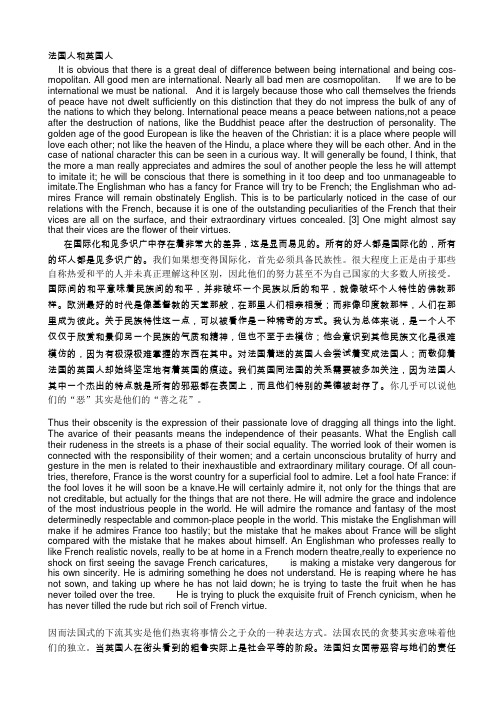
法国人和英国人It is obvious that there is a great deal of difference between being international and being cos-mopolitan. All good men are international. Nearly all bad men are cosmopolitan. If we are to be international we must be national. And it is largely because those who call themselves the friends of peace have not dwelt sufficiently on this distinction that they do not impress the bulk of any of the nations to which they belong. International peace means a peace between nations,not a peace after the destruction of nations, like the Buddhist peace after the destruction of personality. The golden age of the good European is like the heaven of the Christian: it is a place where people will love each other; not like the heaven of the Hindu, a place where they will be each other. And in the case of national character this can be seen in a curious way. It will generally be found, I think, that the more a man really appreciates and admires the soul of another people the less he will attempt to imitate it; he will be conscious that there is something in it too deep and too unmanageable to imitate.The Englishman who has a fancy for France will try to be French; the Englishman who ad-mires France will remain obstinately English. This is to be particularly noticed in the case of our relations with the French, because it is one of the outstanding peculiarities of the French that their vices are all on the surface, and their extraordinary virtues concealed. [3] One might almost say that their vices are the flower of their virtues.在国际化和见多识广中存在着非常大的差异,这是显而易见的。
高级英语第三版lesson7课文翻译
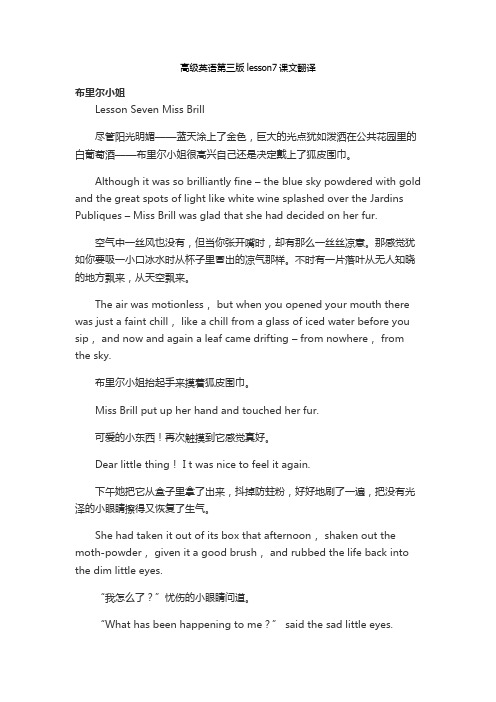
高级英语第三版lesson7课文翻译布里尔小姐Lesson Seven Miss Brill尽管阳光明媚——蓝天涂上了金色,巨大的光点犹如泼洒在公共花园里的白葡萄酒——布里尔小姐很高兴自己还是决定戴上了狐皮围巾。
Although it was so brilliantly fine – the blue sky powdered with gold and the great spots of light like white wine splashed over the Jardins Publiques – Miss Brill was glad that she had decided on her fur.空气中一丝风也没有,但当你张开嘴时,却有那么一丝丝凉意。
那感觉犹如你要吸一小口冰水时从杯子里冒出的凉气那样。
不时有一片落叶从无人知晓的地方飘来,从天空飘来。
The air was motionless, but when you opened your mouth there was just a faint chill, like a chill from a glass of iced water before you sip, and now and again a leaf came drifting – from nowhere, from the sky.布里尔小姐抬起手来摸着狐皮围巾。
Miss Brill put up her hand and touched her fur.可爱的小东西!再次触摸到它感觉真好。
Dear little thing! I t was nice to feel it again.下午她把它从盒子里拿了出来,抖掉防蛀粉,好好地刷了一遍,把没有光泽的小眼睛擦得又恢复了生气。
She had taken it out of its box that afternoon, shaken out the moth-powder, given it a good brush, and rubbed the life back into the dim little eyes.“我怎么了?”忧伤的小眼睛问道。
高英第7课全文翻译

国际经贸高级英语
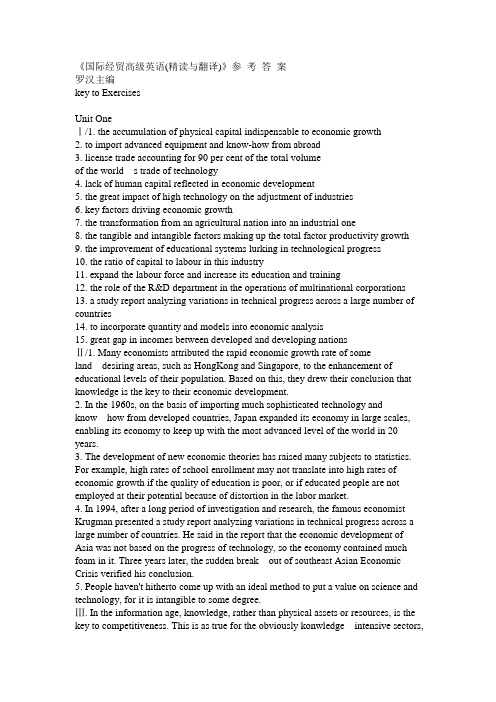
《国际经贸高级英语(精读与翻译)》参考答案罗汉主编key to ExercisesUnit OneⅠ/1. the accumulation of physical capital indispensable to economic growth2. to import advanced equipment and know-how from abroad3. license trade accounting for 90 per cent of the total volumeof the world s trade of technology4. lack of human capital reflected in economic development5. the great impact of high technology on the adjustment of industries6. key factors driving economic growth7. the transformation from an agricultural nation into an industrial one8. the tangible and intangible factors making up the total factor productivity growth9. the improvement of educational systems lurking in technological progress10. the ratio of capital to labour in this industry11. expand the labour force and increase its education and training12. the role of the R&D department in the operations of multinational corporations13. a study report analyzing variations in technical progress across a large number of countries14. to incorporate quantity and models into economic analysis15. great gap in incomes between developed and developing nationsⅡ/1. Many economists attributed the rapid economic growth rate of someland desiring areas, such as HongKong and Singapore, to the enhancement of educational levels of their population. Based on this, they drew their conclusion that knowledge is the key to their economic development.2. In the 1960s, on the basis of importing much sophisticated technology andknow how from developed countries, Japan expanded its e conomy in large scales, enabling its economy to keep up with the most advanced level of the world in 20 years.3. The development of new economic theories has raised many subjects to statistics. For example, high rates of school enrollment may not translate into high rates of economic growth if the quality of education is poor, or if educated people are not employed at their potential because of distortion in the labor market.4. In 1994, after a long period of investigation and research, the famous economist Krugman presented a study report analyzing variations in technical progress across a large number of countries. He said in the report that the economic development of Asia was not based on the progress of technology, so the economy contained much foam in it. Three years later, the sudden break out of southeast Asian Economic Crisis verified his conclusion.5. People haven't hitherto come up with an ideal method to put a value on science and technology, for it is intangible to some degree.Ⅲ. In the information age, knowledge, rather than physical assets or resources, is the key to competitiveness. This is as true for the obviously konwledge intensive sectors,such as software or biotechnology, as it is for industrial age manufacturing companies or utilities.For the knowledge intensive sectors,knowledge which feeds through from research and development to innovative products and processes is the critical element. Butwith industrial age manufacturing companies or utilities, using knowledge aboutcustomers to improve service is what counts.What is new about attitudes to knowledge today is the recognition of the need to harness, manage and use it like any other asset. This raises issues not only of appropriate processes and systems, but also of how to account for knowledge in the balance sheet.In future, the value of intellectual capital will be more widely measured and reported. The measurement and reporting of key performance indicators related to intellectual capital will become a more widespread practice among major organizations, completing the financial accounts.Unit TwoⅠ/1. to crack the FORTUNE Global 5002. a collective enterprise supervised by workers3. be pessimistic about the factory s ability to absorb technology4. the incorporation (mix)of foreign management practices and Chinese nationalism5. a leading guru of Japanese quality control6. to transfer the management concepts to new acquisitions7. the dominant position in China s refrigerator market8. a case study of the management art9. to let shoddy products released to the market in large quantities10. to set the stage for the renovation of the enterprise11. the wholly-owned companies and holding companies under the control of the parent company12. to soak up the laid-offs released from state owned companies13. to sell modern refrigerator making technolog y to the factory14. the state-owned enterprises accounting for the majority of industrial enterprises15. the development of domestic pillar industriesⅡ/1. Although this joint venture has been growing very fast, it still has a long way to go to realize its goal of cracking the Fortune Global 500.2. Haier once tried to place the sample products in sight of the assembly line workers to improve the quality of the products, but now it has outgrown thispractice.3. In the early 1980s, out of every 1000 urban Chinese households, there were only two or three that owned refrigerators. With the enhancement of people's livingstandard, refrigerators have become the first big item in the households buy of many families.4. The company has 70 subsidiaries around the world, one third of which arewholly-owned, with their products sold to 108 countries and areas. In recent years, it has averaged an increase of 50% a year in revenues.5. The rapid development of collective and private enterprises will help to soak up the labour force released from poorly operated state-owned enterprises and to relieve the nation's employment burden.Ⅲ. Many managers feel uncomfortable if not actively involved in accomplishing a given job. This is said to result from a“low tolerance for ambiguity”. The manager desires to know what is happening on a moment by moment basis. A wise manager should know clearly what work must be delegated, and train employees to do it. If after training, an employee is truly unable to perform the work, then replacement should be considered. A manager should avoid reverse delegation.This happens when an employee brings a decision to the manager that the employee should make. An acceptance of reverse delegation can increase the manager'swork load and the employee is encouraged to become more dependent on the boss. Unit ThreeⅠ/1. to issue a vast amount of short term government bonds2. plenty of capital inflow to the security market in the recent period3. the preference of investors to the inflation protected treasury bonds4. to decrease the risk by hedging5. diversified portfolio6. to reach more than 50% of the initial public offering7. dilution of securities caused by the distribution of shares8. the trigger event that causes the imploding on market index9. short maturity U.S. government and corporate fixed income secu r ities10. real assets like commodities and real estate11. to avoid insider-trading charges through legal windows12. some trigger events that will charge the interest rate in the capital market13. reflect investors' wary view of the market14. shepherd the funds every step of the way15. the agriculture bonds that come back in the stock marketⅡ/1. During the past several months, the interest rate and the exchange rate have fluctuated greatly, which has brought enormous loss to many investors. But this institution overrode the adverse factors in the market and still obtained a big profit by wise hedging investments.2. The diversification of portfolio can decrease the non-systematic riskof individual securities in the portfolio efficiently, but it is unable to remove the systematic risk of the market.3. During the period of high inflation in capitalist countries between the late 1960s and late 1970s, many people tended to convert their money incomes into goods or real estate.4. One of the Bundesbank council members said that the central bank is under no immediate pressure to cut interest rates and that it needs more time to study the economic data before making a decision.5. Many experts consider that the interest rates would trend higher, because, although it is true that there is not much inflation now, wage inflation is evidentand the entire economy is in such high gear right now.Ⅲ. For all the similarities between the 1929 and 1987 stock market crashes, there are one or two vital differences. The most important of these was the reaction of the financial authorities. In 1929, the US Federal Reserve reacted to the crash by raising interest rates, effectively clamping down on credit. This caused manyotherwise healthy companies to fail simply due to cash flow problems. If onecompany failed leaving debts, many others down the line would meet the same fate. In 1987, the authorities were quick to lower interest rates and to ensure that ample credit was made available to help institutions overcome their difficulties. There were no widespread business failures and, more importantly, the economy did not enter another depression. There was a period of recession(milder than a 1930s-style depression), but this was largely due to a resurgence of inflation. The sharp interest rate cuts, and excessively hasty financial deregulation, pushed inflation higher, which in turn forced governments to reverse earlier interest rate cuts, prompting an economic slow-down.Unit FourⅠ/1. to rely heavily on monetary flexibility to reign in inflation2. to execute tight monetary policy3. to implement fiscal policy in the form of social insurance and national taxes4. to pour into economically expanding regions5. to replace their individual currencies with a single currency6. to bode well for the future of the EMU7. to control government deficits to meet Maastricht conditions8. the overvalued currency as a main barrier to export9. to refrain from dumping surplus goods abroad10. the influence of integrated economy on capital flow11. the balance-of-payments deficit warranting the devaluation policy adopted by the monetary authority12. to eliminate the economic costs associated with holding multiple currencies13. costs that must be taken into account when estimating profits14. to take advantage of the small difference between the central bank's pegged rates and market rates15. to hedge against risks coming from volatile exchange ratesⅡ/1. Ironically, Europe will see an increase in economic specialization along with the European unification process.2. The European Central Bank will face a dilemma when two member countries both badly need certain monetary policies to regulate their economies but the policies they need are of opposite directions.3. A person will be called an“arbitrageur"if, to gain profits, he takes advantage of the different exchange rates on different markets, or at different times on a same market.4. The national economies of many European countries have recently been forced to fit Maastricht conditions and arbitrary deadlines, and such actions have created unnecessary economic turmoils.5. As a central bank, the Federal Reserve System currently uses its control over the money supply to keep the national inflation rates low and to expand national economies in recession.Ⅲ. Even before construction of the euro is complete, governments can point to one notable success. The past year has seen extraordinary turmoil in global financial markets. Rich country stock markets and currencies have not been spared. Yet Europe has been, comparatively speaking, a safe haven, Intra-European movements in exchange rates have been tiny. This is something that the euro-11 governments had committed themselves to, but their success could not have been taken for granted a year ago. The fact is, at a time of unprecedented financial turbulence, theforeign exchange markets regarded the promise to stabilize intra-European exchange rates as credible. Currencies have held steady and interest rates have converged: it augurs well for the transition to the new system.Unit FiveⅠ/1. a major engine of growth in Asian economy2. the structural weakness in South Korea's financial system3. to execute economic policies which adhere to IMF-aid programs4. a sharp decline in the price competitiveness of that country's exports5. the slump in the Japanese stock market6. a more advantageous position than its rivals in terms of price competitiveness7. trade disputes sparked by price distortion8. the financial panic triggered by the devaluation of Japanese yen9. to stabilize the recently turbulent capital flows10. the advantageous position of industrial countries in the world trade system11. the serious welfare losses for all nations resulted from a full scale trade war12. a USD 58 billion bailout which South Korea was forced to seek from the IMF13. the great expenditure caused by huge government institutions14. technology intensive and knowledge intensive products with high competitiveness15. the country's economy which remains mired in recessionⅡ/1. While the Asian economy regained stability, the possibility of devaluation of the HongKong dollar will be an important variable affecting the recurrence of similar economic crises in Asia.2. In order to connect the improvement of price competitiveness brought about bythe currency depreciation to a better balance of payment, internationalcooperation is as essential as are internal reforms.3. The Asian financial crisis owing to the heavily indebted banking systems,excessive government spending and over reliance on foreign loans has damaged the world economy seriously.4. Some Japanese companies began to fall out of their over reliance on loansfrom the banking system, focusing on profits and cutting out wasteful spending.5. Erupted in July 1997, the Asian financial crisis reflected the defectsin the fragile financial systems of Asian countries.Ⅲ. Like death and taxes, international economic crises cannot be avoided. Theywill continue to occur as they have for centuries past. But the alarmingly rapid spread of the 1997 Asian crisis showed these economies' vulnerability to investor skittishness. Unfortunately, there is no international“911" that emerging markets can dial when facing economic collapse. Neither the IMF nor a new global financial architecture will make the world less dangerous. Instead, countries that want toavoid a rerun of the devastating 1997—98 crisis must learn to protect themselves. And liquidity is the key to financial self help. A country that has substantial international liquidity—large foreign currency reserves and a ready source offoreign currency loans—is less likely to be the object of a currency attack. Substantial liquidity also enables a country already under a speculative siege to defend itself better and make more orderly financial adjustments. The challenge is to find ways to increase liquidity at reasonable cost.Unit SixⅠ/1. capital flight depleting a country s foreign exchange reserves2. domestic hyperinflation caused by devaluation3. to adopt expansionary fiscal policy to increase national income4. be faced with the danger of increasingly shrinking aggregate demand5. capital market harassed by liquidity trap6. to rule out the possibility of massive speculative activities7. to drive down domestic prices at the expense of economic stagnation8. the international gold standard system characterized by fixed exchange rates9. the pressure of hot money flow on currencies10. the neoclassical theory centering on the spontaneous adjustments of market11. intelligent policy makers who will use variable means to achieve economic goals12. flexible fiscal and financial policies that can help the economy out of depression13. the different dilemmas that the developing countries and the mature economies are faced with14. to sacrifice full employment to achieve high output rate15. the increased demand for this currency that will lead to the devaluation of another currencyⅡ/1. The economic turmoil in that country made the central bank and the treasury department take each other to task, which reflected the importance of the collaboration of a country s monetary and fiscal policies.2. The government has now slipped into such a dilemma that if it wants toimprove its balance of payment, it will need to lower the exchange rate, but to lower the exchange rate will lead to inflation.3. Although devaluation will magnify exports, it can also lead to the increasing foreign curren cy denominated debt;it can even cause the collapse of people's confidence in the government. Therefore, the government did not dare to adopt the devaluation policy without careful consideration.4. The increase of foreign currency denominated debt is not necessarilythe indispensable cost of economic development. Because, although it may promote economic growth in the short run, it will increase the burden of domestic enterprises and lead to imbalanced balance of payment in the long run.5. Major capitalist countries had been seeing gold standard as a symbol of strong economic power, but they were forced to give it up for good during the Great Depression.Ⅲ. Troubled Asian Economies have turned out to have many policy and institutional weaknesses. But if America or Europe should get into trouble next year or the year after, we can be sure that in retrospect analysts will find equally damning things to say about Western values and institutions. And it is very hard to make the case that Asian policies were any worse in the 1990s than they had been in previous decades, so why did so much go so wrong so recently?The answer is that the world became vulnerable to its current travails not because economic policies had not been reformed, but because they had. Around the worldcountries responded to the very real flaws in post Depression policy regimes bymoving back toward a regime with many of the virtues of pre-Depressionfree-market capitalism. However, in bringing back the virtues of old fashioned capitalism, we also brought back some of its vices, most notably a vulnerability both toinstability and sustained economic slumps.Unit SevenⅠ/1. government reforms compatible with a country's development program2. lay emphasis on the resolution of government involvement3. the state induced transfer of wealth from the rich to the less fortunate4. to finance the development of public sectors5. a sharp decrease in the subsidy expenditure of a welfare state6. to minimize the public expenditure of this country7. the growth rate of gross fixed asset formation8. heavy interest obligations resulting from huge interest payments9. a certain share of shadow economy in the government performance10. to avoid increasing government spending and lowering the economic growth rates11. the benchmark to assess the scope for reducing the size of government12. be of growing importance in government reforms13. to facilitate adjustment to the new economic environment14. the detrimental short-run effects of reforms on some groups15. the protectionist and competitive devaluation policies administered by some industrial countriesⅡ/1. Over the years, opinions about the role of state have been changing, andpolitical institutions have been changing as well, to accommodate the demand for more state involvement in the economy.2. It's generally believed that even if welfare states cut down the hugewelfare expenditures, they can't necessarily solve their serious economic problems such as large budget deficits and hyperinflation.3. The government carried out the expansionary fiscal policy, which resulted inthe increase of budget deficits. To compensate the deficits, it should take certain measures, such as issuing bonds or increasing the money supply.4. Many industrial countries face the dilemma during their reforms between high inflation rates and low unemployment rates, so they must consider all around to minimize the losses.5. Radical reforms must aim at maintaining public sector objectives while reducing spending. In this process, the role of the government will change from the provider to the overseer or the regulator of activities.Ⅲ. Modern societies have accepted the view that governments must play a larger role in the economy and must pursue objectives such as income redistribution andincome maintenance. The clock cannot be set back and, in fact, it should not be. For the majority of citizens, the world is certainly a more welcoming place now than it was a century ago. However, we argue that most of the important social and economic gains can be achieved with a drastically lower level of public spendingthan that which prevails today. Perhaps the level of public spending does not needto be much higher than, say, 30 percent of GDP to achieve most of the importantsocial and economic objectives that justify government intervention. Achievingthis expenditure level would require radical reforms, a well-functioning private market, and an efficient regulatory role for the government.Unit EightⅠ/1. winds of reform in Japan s banking sector2. the amended Bank of Japan Law in line with the global standards for autonomy and transparency3. touch on the paramount goal in the sphere of monetary policies4. charge the central bank with maintaining price stability and nurturing a secure credit system5. generate unnecessary panics in the financial markets6. the execution of monetary policies independent of the bureaucracy7. the institutions in charge of formulating the interest rate policies8. a discount rate at a historical low of 0.5%9. to keep maintaining and nurturing the credit system in accordance with the state policy10. in the spheres of fiscal and monetary policies11. the new economic law entering force this year12. in the context of propelling economic reforms13. to strengthen the government s functions through fiscal policies14. key measures which have won confidence from the market15. the implementation of a merit based promotion systemⅡ/1. It is no overstatement to say that the bad accounts in Japan's banks have accumulated to a very high level.2. The central bank's quasi-bureaucratic status has stymied its normal operations, so many economists call for the enhancement of its autonomy in accordance with the global standards.3. It has been normal for bank shares to march in line with movements in net interest margins, which means bank shares tend to rise as net margins widen and fall as the latter narrow.4. Japan's bank shares are in a different position from their American counterparts: America s bank shares have already risen sharply thanks to the country's full-fledged economic recovery, while Japan's bank shares are still weak as the banks struggle to get to grips with their bad debts.5. Runs on the banks proliferated and a sharp fall in bank loans followed, before the non-performing loans, amounting to 30% of bank assets, were taken over by the state in 1997.Ⅲ. How fast Japan's financial system seems to be reforming. Barely a week goes by without news of another merger between Japan s huge but troubled financial firms. Deregulation is the spur. Three years ago the government announced a “Big Bang"for the country's financial-services industry. This would tear down firewallsthat had largely stopped insurance companies, banks and stockbrokers from competing in each other's patches. It was also meant to put an end to arbitrary, stiflingand often corrupt supervision.The biggest reason for deregulation in this way was that Japan's incestuous,Soviet'style financial system was hopelessly bad at allocating credit around the economy. The massive bad-loan problems that have plagued the country's banks for most of the 1990s are merely one symptom of an even bigger ill. Even so, there was wide spread scepticism that the government would go through with the cure. It deserves some credit, therefore, for largely sticking to its plans.Unit NineⅠ/1. the most commonly used measures of income distribution2. the shift from labour to capital markets3. specialization in production and the dispersion of specialized production processes4. the widening gap between the wages of skilled workers and those of unskilled workers5. new production techniques biased toward skilled labor6. economic inefficiency and distortions retarding growth7. sustainable growth and a viable balance of payments policy8. a broadly based, efficient and easily administered tax system9. reduce disparities in human capital across income groups10. targeted programs consistent with the macroeconomic framework11. constitutional rules on revenue sharing12. to promote equality of opportunities through deregulating economy13. cash compensation in lieu of subsidies14. stimulate the use of public resources and the overall economic growth15. take effective measures to promote employment and equityⅡ/1. Much of the debate about income distribution has centered on wage earnings, which have been identified as an important factor in the overall distribution of incomes. But in Africa and Latin America, unequal ownership of land is a factor that cannot be ignored.2. Globalization has linked the labor, product and capital markets of theeconomies around the world and has indirectly led to specialization in production and the dispersion of specialized production processes to geographically distant locations.3. Although fiscal policies are usually viewed as the principal vehicle for assisting low-income groups and those affected by reform programs, quite a number of countries have adopted specific labor market policies in an effort to influence income distribution.4. Measures governments can take to promote equality of opportunities include deregulating the economy;setting up strong and responsible institutions, including a well functioning judicial system;reducing opportunities for corrupt practices;and providing adequate access to health and education services.5. Another important issue is whether governments should focus on outcomes—such as decreasing the number of people living in poverty, or ensuring that all members of society have equal opportunities.Ⅲ. One theory on wealth distribution indicates that irrational distribution andcorruption are the major reasons for the uneven income level. According to this theory, wealth goes through four stages of distribution—the market, the government, non governmental organizations and unlawful activities, mainly corruption. Usually the first stage of distribution—the market—will result in an uneven spread of resources, which should be redressed by the second distribution stage, the government. In the third stage, the distribution of wealth is realized through contributions and donations made by non governmental organizations. The contributions are given to the poor in the form of charity activities. Thenfollows illegal grabbing of wealth, such as robbery, embezzlement, tax evasion andbribery. Their harm to social equality and stability is enormous and cannot really be measured.Unit TenⅠ/1. to facilitate the establishment of a new form of leadership in today's corporations2. to link a corporation's developing prospective to its present business performance3. companies which forge ahead in the rather changeable world economy4. to encourage domestic enterprises to seek out opportunities to enter foreign markets5. to instill development strategies of new products into employees at all levels6. to consider the promotion in the company the criteria to judge whether one is successful or not。
《新交际英语阅读教程4》参考译文U7 Economy and Trade 文章翻译
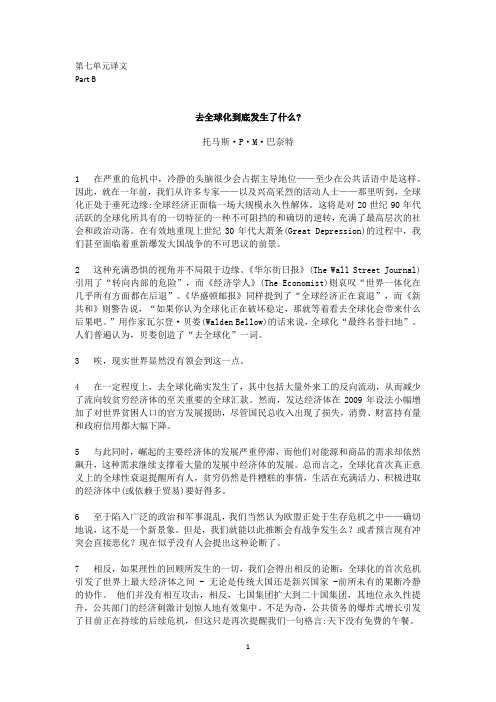
第七单元译文Part B去全球化到底发生了什么?托马斯·P·M·巴奈特1 在严重的危机中,冷静的头脑很少会占据主导地位——至少在公共话语中是这样。
因此,就在一年前,我们从许多专家——以及兴高采烈的活动人士——那里听到,全球化正处于垂死边缘:全球经济正面临一场大规模永久性解体。
这将是对20世纪90年代活跃的全球化所具有的一切特征的一种不可阻挡的和确切的逆转,充满了最高层次的社会和政治动荡。
在有效地重现上世纪30年代大萧条(Great Depression)的过程中,我们甚至面临着重新爆发大国战争的不可思议的前景。
2 这种充满恐惧的视角并不局限于边缘。
《华尔街日报》(The Wall Street Journal)引用了“转向内部的危险”,而《经济学人》(The Economist)则哀叹“世界一体化在几乎所有方面都在后退”。
《华盛顿邮报》同样提到了“全球经济正在衰退”,而《新共和》则警告说,“如果你认为全球化正在破坏稳定,那就等着看去全球化会带来什么后果吧。
”用作家瓦尔登·贝娄(Walden Bellow)的话来说,全球化“最终名誉扫地”。
人们普遍认为,贝娄创造了“去全球化”一词。
3 唉,现实世界显然没有领会到这一点。
4 在一定程度上,去全球化确实发生了,其中包括大量外来工的反向流动,从而减少了流向较贫穷经济体的至关重要的全球汇款。
然而,发达经济体在2009年设法小幅增加了对世界贫困人口的官方发展援助,尽管国民总收入出现了损失,消费、财富持有量和政府信用都大幅下降。
5 与此同时,崛起的主要经济体的发展严重停滞,而他们对能源和商品的需求却依然飙升,这种需求继续支撑着大量的发展中经济体的发展。
总而言之,全球化首次真正意义上的全球性衰退提醒所有人,贫穷仍然是件糟糕的事情,生活在充满活力、积极进取的经济体中(或依赖于贸易)要好得多。
6 至于陷入广泛的政治和军事混乱,我们当然认为欧盟正处于生存危机之中——确切地说,这不是一个新景象。
国际经贸高级英语精读与翻译

销活动。
• 产品销售渠道
• 含义
• 销售渠道(channel)所谓销售渠道是指"产品从生产者向消费者转移 所经过的通道或途径,它是由一系列相互依赖的组织机构组成的商业 机构。即产品由生产者到用户的流通过程中所经历的各个环节连接起 来形成的通道。销售渠道的起点是生产者,终点是用户,中间环节包 括各种批发商、零售商、商业服务机构(如经纪人、交易市场等)。
• According to the wellknown ‘Four Ps’ formulation of the marketing mix(product, place, promotion and price),this is clearly a matter of promotion. Since budgets are always limit, marketers, usually have to decide which tools-advertising, public relations, sales promotion, or personal selling-to use ,and in what proportion.
• 1 推销人员
• 推销人员是指主动向推销对象销售商品的推销主体,包括各类推销员。在推 销的三个基本要素中,推销人员是最关键的。真正的推销不是推销产品,而 是推销自己。推销成功与否,往往取决于你的服务精神和态度,因为你是世 界上独一无二的,只有顾客喜欢你的为人、你的个性、你的风格,他才会购 买你的产品。尽管说"每个人都是推销员",但对职业化的推销员来讲,推销 具有更丰富的内涵。
• "营销理念" 背后的基本内 容--你做你能卖的, 而不是 卖你做的--并不意味着你 的产品会自行出售。即使 是一个很好的, 有吸引力 的价格产品, 显然满足了 需求, 必须让它知道它的 目标......。客户。在标准 产品生命周期的引入和成 长阶段, 生产者 (或进口商 等) 必须开发产品或品牌 ......, 即通知潜在客户 (和 经销商、经销商和零售商 ) 关于该产品的存在性、 特点、优势等。
国际经贸高级英语精读与翻译

2.利益与社会责任 企业社会责任和企业利益之间,德隆克曾经讲商业组织的 目的是创造顾客。作为企业如果要创造更多的顾客,顾客确实 为企业本身带来商业利益。作为责任来讲他本身所有的方式是 参与到全过程,企业本身的利益也是和社会各个关系人联系在 一起的,一直以来应该是利润最大化,要对股东负责,但事实 上企业要保持一个能够持续成长的趋势,实际上不应该仅仅局 限于为股东负责,实际上是站在利润最大化上面。 所以我们认为,企业就像一棵种子,社会就是一块土地,如果 这个企业本身能够种入到土地中间去,这个企业不是纯粹站在 企业自身的利益,种子在土里死掉才能产生新的生物,长出更 多的树木回馈社会。所以企业更多的时候在利益和社会责任之 间找到平衡。
Unit 15 Business EthicsOnce Sold, Caveat Emptor.
2014-12-23
1
学习目标
• 本单元的要点 • 本单元主要是一篇关于商业的社会责任的不同观 点的文章,以及讨论某些商业做法的论理问题的 练习。有些人认为,商业的目的以及经理的作用 就是为公司所有者、股份或股票持有者获取最大 的利润;另外一些人认为公司绝对不能欺骗顾客, 但是这只是出于商业考虑而不是出于道德上的考 虑:一个对公司失望的顾客以后不再购买该公司 的产品。还有一些人坚持认为公司对顾客、员工、 生意上的伙伴、当地的社区、整个社会以及自然 环境具有社会和道德上的责任,这种责任与为股 份持有者创造金钱的回报一样重要,甚至更加重 要。从课文中可以看到这些不同的观点。
3howrelationshipbetweenprofitmaximizationbusinessethics词汇和短语词汇和短语bribery贿赂builtinobsolescence内置废弃内在的废品charity慈善compensation补偿赔偿disapprove不赞成ethics伦理道德规范industrialespionage工业间谍legitimacy合法性正统性lobby游说议员词汇和短语词汇和短语perfectcompetition完全竞争pollution污染proponent建议者支持者拥护者rational合理的理性的socialresponsibility社会责任stakeholder利益相关者unbusinesslike无组织的无效能的vitality活力welfarecapitalism福利资本主义whistleblowing裁判仲裁profitssocialresponsibilitysummarizearticle课文压缩profitssocialresponsibilitysummarize1920smanylargeamerican20世纪20年代很多的美companiesbeganbuildnewsystems国大企业开始建立一些新的goodobviouslygoodcompanies
高级英语第二册第七课课文翻译
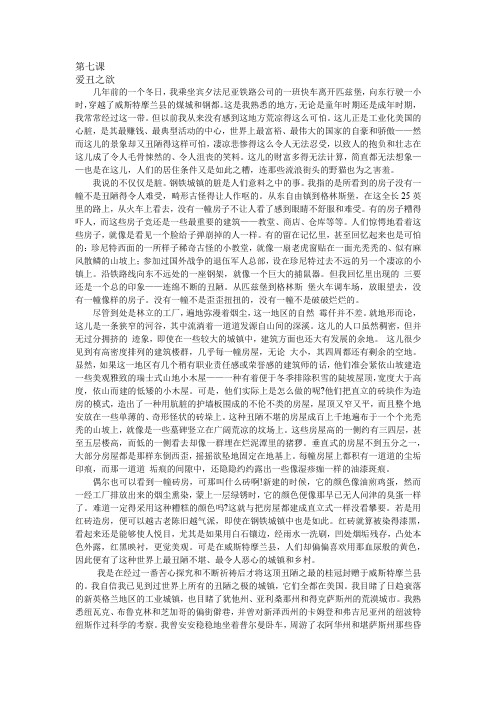
第七课爱丑之欲几年前的一个冬日,我乘坐宾夕法尼亚铁路公司的一班快车离开匹兹堡,向东行驶一小时,穿越了威斯特摩兰县的煤城和钢都。
这是我熟悉的地方,无论是童年时期还是成年时期,我常常经过这一带。
但以前我从来没有感到这地方荒凉得这么可怕。
这儿正是工业化美国的心脏,是其最赚钱、最典型活动的中心,世界上最富裕、最伟大的国家的自豪和骄傲——然而这儿的景象却又丑陋得这样可怕,凄凉悲惨得这么令人无法忍受,以致人的抱负和壮志在这儿成了令人毛骨悚然的、令人沮丧的笑料。
这儿的财富多得无法计算,简直都无法想象——也是在这儿,人们的居住条件又是如此之糟,连那些流浪街头的野猫也为之害羞。
我说的不仅仅是脏。
钢铁城镇的脏是人们意料之中的事。
我指的是所看到的房子没有一幢不是丑陋得令人难受,畸形古怪得让人作呕的。
从东自由镇到格林斯堡,在这全长25英里的路上,从火车上看去,没有一幢房子不让人看了感到眼睛不舒服和难受。
有的房子糟得吓人,而这些房子竞还是一些最重要的建筑——教堂、商店、仓库等等。
人们惊愕地看着这些房子,就像是看见一个脸给子弹崩掉的人一样。
有的留在记忆里,甚至回忆起来也是可怕的:珍尼特西面的一所样子稀奇古怪的小教堂,就像一扇老虎窗贴在一面光秃秃的、似有麻风散鳞的山坡上;参加过国外战争的退伍军人总部,设在珍尼特过去不远的另一个凄凉的小镇上。
沿铁路线向东不远处的一座钢架,就像一个巨大的捕鼠器。
但我回忆里出现的三要还是一个总的印象——连绵不断的丑陋。
从匹兹堡到格林斯堡火车调车场,放眼望去,没有一幢像样的房子。
没有一幢不是歪歪扭扭的,没有一幢不是破破烂烂的。
尽管到处是林立的工厂,遍地弥漫着烟尘,这一地区的自然霉仟并不差。
就地形而论,这儿是一条狭窄的河谷,其中流淌着一道道发源自山间的深溪。
这儿的人口虽然稠密,但并无过分拥挤的迹象,即使在一些较大的城镇中,建筑方面也还大有发展的余地。
这儿很少见到有高密度排列的建筑楼群,几乎每一幢房屋,无论大小,其四周都还有剩余的空地。
国际经贸高级英语 精读与翻译 第7课 中英对照课文翻译
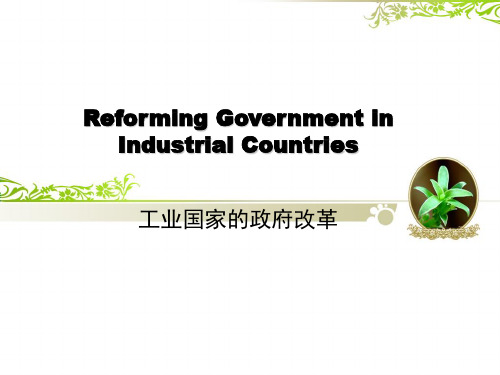
•
然而,在19世纪后期,古 典经济学家(的观点)受到 马克思主义和社会主义构 想的威胁.再分配被加入政 府的合法功能,要求一些国 家引导的从富者到欠富者 的财富转移.在那时,公众 基础教育已经占主导地位. 在19世纪八十年代,只是 (给公众)带来最小的合适 的利益,社会保障制度首先 在德国引入.尽管如此,政 府的职责还是相当局限的.
•
In the later part of the nineteenth century, however,classical economists were challenged by Marxian and socialist thinking .Redistribution was added to the legitimate functions of government ,demanding some state-induced transfer of wealth from the rich to the less fortunate.By that time ,public primary education was already predominant ,and the first social security system,albeit with minimal eligibility and benefits ,was introduced in Germany in the 1880s.Nevertheless, the role of government remained limited.
•
The period after WWII .The post-WWII period,and particularly the period between 1960 and 1980,saw an unprecedented enthusiasm for activist expenditure policies.Various factorssuch as Keynesian economics,the challenge of socialism,and the theory of public goods and externalities-contributed to this development.
经贸高级英语课后中英对照1-6课

Unit OneⅠ/1.对经济增长必不可少的实物资本的积累the accumulation of physical capital indispensable to economic growth2. 引进国外的先进设备和技术诀窍to import advanced equipment and know-how from abroad3.占世界技术贸易总量90%的许可证贸易license trade accounting for 90 per cent of the total volume of the worldstrade of technology4.经济发展中所反映出来的人力资本的匮乏lack of human capital reflected in economic development5. 高科技对产业调整的重大影响the great impact of high technology on the adjustment of industries6.推动经济增长的关键因素key factors driving economic growth7. 从一个农业国向工业国的转型the transformation from an agricultural nation into an industrial one8. 构成全要素生产率增长的有形和无形要素the tangible and intangible factors making up the total factor productivitygrowth9. 隐藏在技术进步之后的教育系统的改善the improvement of educational systems lurking in technological progress10.该产业中资本与劳动力的比率the ratio of capital to labour in this industry11. 增加劳动力数量并提高其教育培训程度expand the labour force and increase its education and training12. 研发部门在跨国公司经营中的作用the role of the R&D department in the operations of multinational corporations13. 一份对多国技术进步情况进行分析的报告 a study report analyzing variations in technical progress across a largenumber of countries14. 把计量和模型结合引入经济分析to incorporate quantity and models into economic analysis15. 发达国家和发展中国家在收入上的巨大差距great gap in incomes between developed and developing nationsⅡ/1.不少经济学家认为,像香港、新加坡这样土地稀少的地区,其经济的快速发展应该主要归功于教育程度的提高。
高级英语1 Unit7 French and English翻译

法国人和英国人It is obvious that there is a great deal of difference between being international and be- ing cosmopolitan. All good men are international. Nearly all bad men are cosmopolitan. If we are to be international we must be national. And it is largely because those who callthemselves the friends of peace have not dwelt sufficiently onthis distinctionthat they donot impress the bulk of any of the nations to which they belong. International peace means a peace between nations,not a peace after the destruction of nations, like the Buddhist peace after the destructionof personality. The goldenage of the good Europeanis like theheavenof the Christian: it is a place where people will love eachother; not like the heavenof the Hindu, a place where they will be each other. And in the case of national characterthis can be seen in a curious way. It will generally be found, I think, that the more a man re- ally appreciates and admires the soul of another people the less he will attempt to imitate it; he will be conscious that there is somethinginit too deep and too unmanageable to imi -tate.The Englishmanwho has a fancy for France will try to be French; the Englishmanwhoadmires France will remainobstinately English. This is to be particularly noticed inthe caseof our relations with the French,because it is one of the outstanding peculiarities of the Frenchthat their vices are all onthe surface, and their extraordinary virtues concealed. [3]One might almost say that their vices are the flower of their virtues.在国际化和见多识广中存在着非常大的差异,这是显而易见的。
商务英语阅读课文翻译第7 课
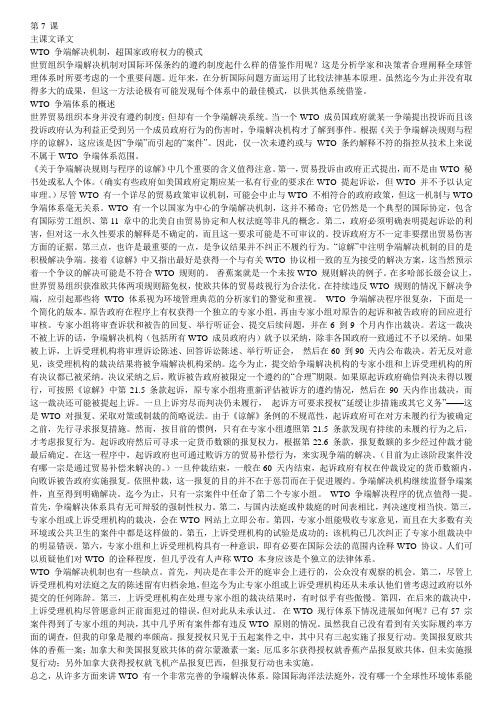
第7 课主课文译文WTO 争端解决机制,超国家政府权力的模式世贸组织争端解决机制对国际环保条约的遵约制度起什么样的借鉴作用呢?这是分析学家和决策者合理阐释全球管理体系时所要考虑的一个重要问题。
近年来,在分析国际问题方面运用了比较法律基本原理。
虽然迄今为止并没有取得多大的成果,但这一方法论极有可能发现每个体系中的最佳模式,以供其他系统借鉴。
WTO 争端体系的概述世界贸易组织本身并没有遵约制度;但却有一个争端解决系统。
当一个WTO 成员国政府就某一争端提出投诉而且该投诉政府认为利益正受到另一个成员政府行为的伤害时,争端解决机构才了解到事件。
根据《关于争端解决规则与程序的谅解》,这应该是因“争端”而引起的“案件”。
因此,仅一次未遵约或与WTO 条约解释不符的指控从技术上来说不属于WTO 争端体系范围。
《关于争端解决规则与程序的谅解》中几个重要的含义值得注意。
第一,贸易投诉由政府正式提出,而不是由WTO 秘书处或私人个体。
(确实有些政府如美国政府定期应某一私有行业的要求在WTO 提起诉讼,但WTO 并不予以认定审理。
)尽管WTO 有一个详尽的贸易政策审议机制,可能会中止与WTO 不相符合的政府政策,但这一机制与WTO 争端体系毫无关系。
WTO 有一个以国家为中心的争端解决机制,这并不稀奇;它仍然是一个典型的国际协定,包含有国际劳工组织、第11 章中的北美自由贸易协定和人权法庭等非凡的概念。
第二,政府必须明确表明提起诉讼的利害,但对这一永久性要求的解释是不确定的,而且这一要求可能是不可审议的。
投诉政府方不一定非要摆出贸易伤害方面的证据。
第三点,也许是最重要的一点,是争议结果并不纠正不履约行为。
“谅解”中注明争端解决机制的目的是积极解决争端。
接着《谅解》中又指出最好是获得一个与有关WTO 协议相一致的互为接受的解决方案,这当然预示着一个争议的解决可能是不符合WTO 规则的。
香蕉案就是一个未按WTO 规则解决的例子。
Unit7课文翻译

Unit7课文翻译课文ASurviving an economic crisis经济危机中求生存1.许许多多的人正经历的这场经济萧条发端于美国。
对抵押贷款监管不力,致使当时的风险评估远低于现在的最终结果。
由于大量的房产所有人无法偿还贷款,负责监管的公司、放贷的公司(以及其子公司及股份持有者)都损失了大笔的金钱。
这些巨额亏损的后果很快就影响到美国就业市场,造成下岗或解雇。
经济复兴迟迟不来。
许多人几个月来都是苦苦挣扎,正如下面故事中的主人公那样。
2.苏•约翰逊有好几个月都未付房租了,面临着被逐出的境地,她把能塞进她的那辆双门轿车的东西都打包收拾好,离城而去。
3.她最后在一家汽车旅馆落脚,交付了260美元的定金,这还是她设法从朋友那儿以及卖掉家具后凑齐的,是苏在失业救济金被终止后所有的余钱。
她面临流浪生活,这在以前是难以想象的,而她不久以前都还在大都市里一家公司供职,并就读于商学院研究生班。
4.苏明白自己最终很可能以车为家。
她如今已成为倒霉的失业群体中的一份子,他们自称“99周人”,因为他们已经领完至多9周的失业保险救济金。
5.根据劳动统计局的数据,长期失业率已达到创纪录的水平。
些许的失业救济金对那些失去工作的人来说可是救命钱,这使他们不至于形貌落魄,无立锥之地;不至于无钱加油,缴不起电费话费。
6.一旦收不到失业救济支票,哪怕是像苏这样曾经贵为技术公司客服经理的人,也会日益跌入经济窘迫的深渊;原有工薪阶层或中产阶级的最后一抹荣光也已消逝不在,所有人都前途未卜。
7.当苏收到最后一笔失业救济支票时,阵阵悲凉涌上心头。
由于没有收入进账,苏的活期账户余额转为负值。
汽车行将被收回!而且信贷公司不断骚扰,催还车贷,让她成天压力倍增。
每天,苏就像乒乓球一样在信心和绝望之间起落不定。
8.生活境遇真是令人痛心地一落千丈!想想仅在短短的一年半之前,苏在原有工作岗位上可挣到56,00美元的年薪,可在像墨西哥、加勒比那样的地方度假,还就读于名校商学院。
外教社大学英语精读第三册unit7原文+翻译+课后翻译
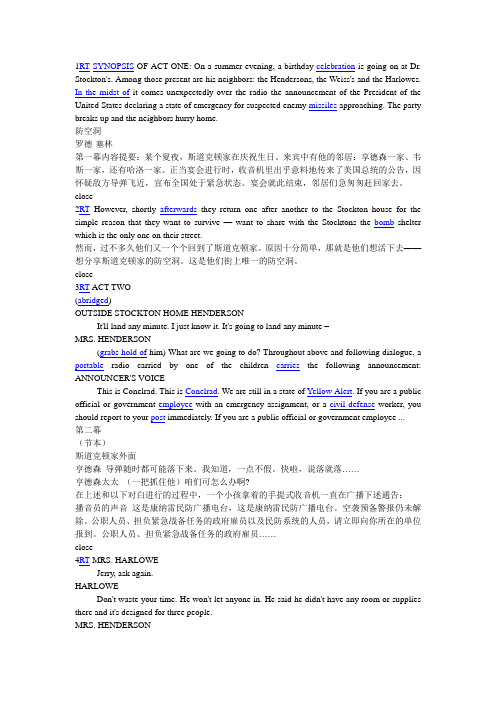
1RT SYNOPSIS OF ACT ONE: On a summer evening, a birthday celebration is going on at Dr. Stockton's. Among those present are his neighbors: the Hendersons, the Weiss's and the Harlowes. In the midst of it comes unexpectedly over the radio the announcement of the President of the United States declaring a state of emergency for suspected enemy missiles approaching. The party breaks up and the neighbors hurry home.防空洞罗德·塞林第一幕内容提要:某个夏夜,斯道克顿家在庆祝生日。
来宾中有他的邻居:享德森一家、韦斯一家,还有哈洛一家。
正当宴会进行时,收音机里出乎意料地传来了美国总统的公告,因怀疑敌方导弹飞近,宣布全国处于紧急状态。
宴会就此结束,邻居们急匆匆赶回家去。
close2RT However, shortly afterwards they return one after another to the Stockton house for the simple reason that they want to survive —want to share with the Stocktons the bomb shelter which is the only one on their street.然而,过不多久他们又一个个回到了斯道克顿家。
原因十分简单,那就是他们想活下去——想分享斯道克顿家的防空洞。
高级英语Lesson7 the age of miracle chips

Company Logo
VOCABULARY & TRANSLATION
evolve v. (cause to) develop naturally and (usu) gradually versatile a. having many different kinds of skill or ability or use, all-sided 虽然绝大多数美国人对于这种惰性小薄片尚不熟悉, 但它却具有相当惊人的威力,并且正在使我们的社会 发生着巨变。这种被称作“神奇的集成电路片”的东 西具有等同于25年前的足有一间房大的老式计算机的 运算能力。那种老式电脑由许许多多真空管和错综交 错的导线组成,体积庞大笨重,犹如一个怪物。虽然 是在老式电脑的基础上发展而来的,但所不同的是, 集成电路片造价低廉,易于大规模生产,计算速度快, 用途广泛,而且使用方便。 mass produce:mass n-状语 The seedings are machine planted.
Company Logo
Background information
3
The Time magzine
Company Logo
Brief introduction to Time
Time is an American newsmagazine published weekly.
The European edition (Time Europe) is published from Introduction London and covers the Middle East, Africa and, since 2003, Latin America. Strategy An Asian edition (Time Asia) is based in Hong Kong. Challenges covering The South Pacific edition,Forward Australia, New Zealand and the Pacific Islands, is based in Sydney. Conclusion The magazine has suggested that, through a backronym, the letters T-I-M-E stand for The International Magazine of Events.
